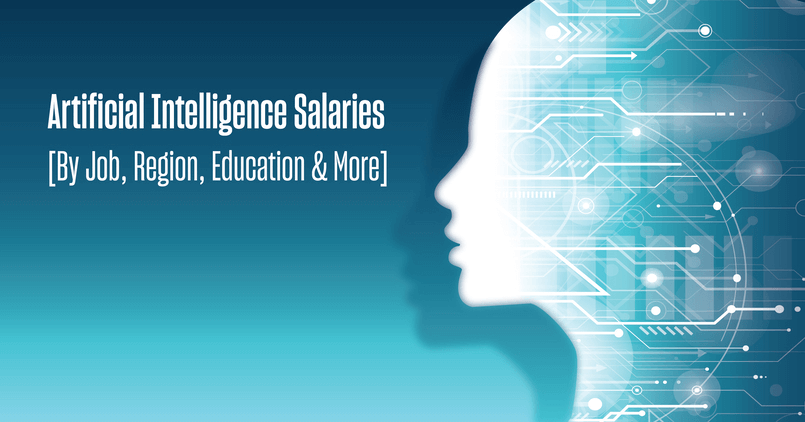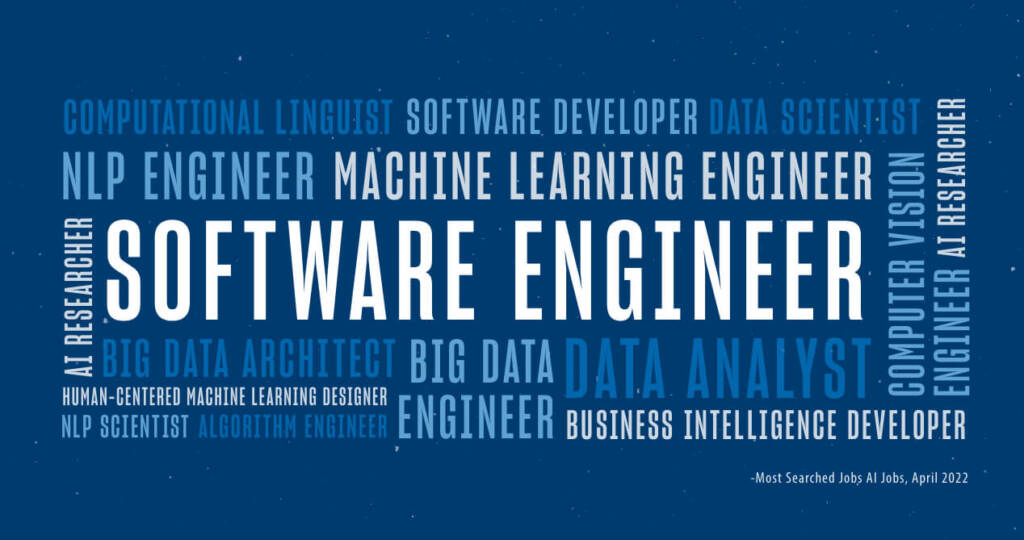In a world where technology seems to become more sophisticated by the minute, the demand for artificial intelligence jobs is growing — and fast. The Enterprisers Project reports that artificial intelligence will create 133 million new jobs by 2022, and a recent survey from Dun & Bradstreet revealed that 40 percent of the respondents’ organizations are adding more jobs as a result of using artificial intelligence.
Rob Toews, a venture capitalist at Highland Capital Partners, writes about artificial intelligence for Forbes. In a recent article about the current and future state of AI, he said this: “If anything, this breakneck pace is only accelerating. Five years from now, the field of AI will look very different than it does today. Methods that are currently considered cutting-edge will have become outdated; methods that today are nascent or on the fringes will be mainstream.”
In this guide, learn more about the most common jobs within the ever-growing field of artificial intelligence, including salary ranges, top companies looking for the top AI talent and tips for increasing your AI salary.
AI Salary Overview
The demand for artificial intelligence jobs is extremely high, with many salaries well into six figures. The exact numbers will depend on many factors, including the specific job responsibilities, industry, experience, education level and geographic location.
But here is a typical range: On the lower end, Indeed reports that a research engineer will make approximately $125,695 per year with a machine learning engineer making around $166,574.
According to Datamation, the average salary for an artificial intelligence programmer is between $100,000 and $150,000. AI engineers, on the other hand, earn an average of $171,715 with the top earners making more than $250,000.
Datamation explains that these high salaries are due to a rare combination of skills and the need for advanced degrees.
Comparison Table
The need for skilled artificial intelligence professionals spans almost all industries, public agencies and nonprofits, with particularly strong demand and opportunity in such fields as:
- Financial services
- Health care
- Technology and home automation
- Media
- Marketing
- Manufacturing
- National security
- Government and military
- IoT-enabled systems
- Retail
Now let’s break down the most common jobs within artificial intelligence:
| Job Title | Education | Years of Experience | Average Salary |
| Research Scientist | Expected to have a master’s or doctoral degree in computer science or a related technical field that’s supported by experience.* | The ability to demonstrate “extensive knowledge and experience” in the following areas: computer perception, graphical models, reinforcement learning and natural language processing.* | $101,114 |
| Software Engineer | Bachelor’s in software engineering, software development, computer programming, computer science, mechanical engineering. | Entry-level roles may require only an associate degree and/or experience in a technical bootcamp.+++ | $123,682 |
| AI Engineer |
| 5 years of experience (preferably more) in numerous programming languages.+ | Range of $114,000 to $141,000 |
| Machine Learning Engineer | Hiring companies prefer a master’s or doctoral degree in math, computer science, or AI.* |
| $166,574 |
| Data Scientist | Advanced degree in computer science is preferred.* |
| $126,927 |
| Business Intelligence (BI) Developer | A bachelor’s in engineering, computer science or a related field is required. A combination of experience and certifications is desired.* | “Considerable experience” in the following: data warehouse design, data mining, SQL queries, SQL Server Integration Services, SQL Server Reporting Services, and BI technologies.* | $107,880 |
| Big Data Engineer/Architect | Preference is given to those who have completed a Ph.D. in mathematics, computer science or a related field.* |
| $130,674 |
*Springboard Blog 5 Careers in Artificial Intelligence
+ freelancermap Career Insights: What Does an AI Engineer Do?
++Springboard Blog How to Become an AI Engineer
+++Glassdoor How to Get a Job as a Software Engineer
It’s also important to note that certain AI positions may also require you to obtain a TS/SCI clearance.
AI Salary by Region & State
Many AI positions are concentrated in key U.S. cities and states with booming tech centers. According to TechRepublic, the top states and their respective cities for artificial jobs are:
| State | Top City/Cities |
| California | San Jose, San Francisco, Los Angeles, San Diego |
| District of Columbia | Washington, D.C. |
| Washington | Seattle |
| New York | New York City |
| Massachusetts | Boston |
| Illinois | Chicago |
| Texas | Austin, Dallas |
It’s probably no surprise that California tops the list as four major metro areas in the state are listed in its top 15 list.
According to Built In San Francisco, some of the biggest names in technology call Silicon Valley home, including:
- Apple
- Hewlett Packard
- Oracle
- Intel
- Cisco
- Broadcom
- Adobe
- eBay
TechRepublic also “found that states with the most AI jobs tend to have strong tech, healthcare, or government sectors.”
The Enterprisers Project reinforces that fact, listing New York, San Francisco, Washington, D.C., San Jose and Seattle at the top of the AI job market. “Many West Coast-based tech companies (such as Amazon, Facebook, and Google) have a significant presence in the region. And New York has its share of AI-related tech startups.”
In a recent LinkedIn search for artificial intelligence positions, the following locations offered the most results:
- Seattle (4,364)
- San Francisco (3,410)
- Boston (3,095)
- New York City (1,433)
- Chicago, IL (1,261)
Now let’s analyze the salary for a specific AI position. As you will see, the salary will vary depending on the location, but it’s also important to remember that each position may require varying levels of experience and education.
The highest paying U.S. cities for a machine learning engineer, according to Udacity are:
- San Francisco Bay Area – $187,353
- Bellevue, WA – $173,241
- San Francisco, CA – $172,138
- Boston, MA – $166,513
- New York, NY – $153,590
Top Companies Hiring for AI Positions
According to TechRepublic, here are some of the top companies that are recruiting for AI positions:
- Microsoft
- Nvidia
- JD.com
- Intel
- SAP
- Accenture
- Nokia
Of course there are many more. A recent search for “artificial intelligence” job openings on LinkedIn revealed more than 49,000 results at a wide variety of companies, some of which are cited below. (You can see similar LinkedIn search results here.)
- Amazon
- Deloitte
- Lockheed Martin
- Booz Allen Hamilton
- Hewlett Packard Enterprise
- Johnson & Johnson
- Fidelity Investments
- Thermo Fisher Scientific
- PlayStation
- Tik Tok
- UPS
- Uber
- Wayfair
- Warner Bros. Entertainment
How to Boost Your AI Salary
Advance your hard skills or learn new ones
Different AI positions will likely require different hard skills, but all will demand a variety of technical and data-driven abilities. For example, a machine learning engineer should have experience with programming languages such as Java, Python and Scala. A data scientist needs to understand big data platforms. If you’re just starting out, it’s beneficial to take courses that cover Bayesian networking, computer science, cognitive science theory, engineering, physics, robotics and varying levels of math, according to Springboard.
Improve and develop your soft skills
Indeed defines soft skills as “personal habits and traits that shape how you work, on your own and with others.” No matter the job or position, soft skills are essential for success — especially in an evolving industry like artificial intelligence.
“Data computation, mathematics and algorithms are required skills to create artificial intelligence. But AI has a human aspect to it as well,” explains Springboard. “It is made to interpret and adapt to human behavior, and give responses that feel similar to human responses.”
That’s where your soft skills come in. For example, critical thinking, creativity, curiosity, the aptitude to work under pressure and the ability to collaborate are all important for varying AI positions.
Do your research
It’s important to know what your position is worth, especially in terms of location, so that you’re as prepared as possible for any salary negotiation. Consult top job websites such as Indeed, Glassdoor, PayScale and LinkedIn for more information.
Earn certifications
Certification programs will not only provide valuable education but also add to your experience, knowledge and skillset — all of which may translate to an increased salary. For example, TechRepublic’s 7 recommended data science certifications include the IBM Data Science Professional Certificate, SAS data scientist certifications, Oracle Business Intelligence Certification and more. A Data Analytics and Visualization Certificate is also a good option.
Advance your education with a master’s degree
One of the best ways to boost your AI salary is through advanced education. A master’s degree will help you achieve a deeper understanding of AI concepts, topics and theories. It’s also a valuable way to gain first-hand experience and meet other professionals in the industry. All of this can translate to helping you gain an important advantage in the job market.
“With most degrees, you can increase your earning power within your profession as you move up from a bachelor’s to a master’s to a doctorate,” according to The Balance Careers blog.
According to Datamation, “35 percent of AI positions require a Ph.D. and 26 percent require a master’s degree. Why? Because AI is a rapidly growing field and when you study at the Ph.D. level and participate in academic projects, they tend to be cutting edge if not bleeding edge, and that gives the student the experience they need for the work environment.”
Download Our Comprehensive Checklist for Choosing the Right AI Degree Program
Educational Preparation in Artificial Intelligence
High-paying career opportunities in AI and related disciplines continued to expand across a variety of industries. The University of San Diego — a highly regarded industry thought leader and education provider — offers an innovative, online AI master’s degree program, the Master of Science in Applied Artificial Intelligence, which is designed to prepare graduates for success in this important fast-growing field. This program includes a significant emphasis on real-world applications, ethics, privacy, moral responsibility and social good in designing AI-enabled systems.



